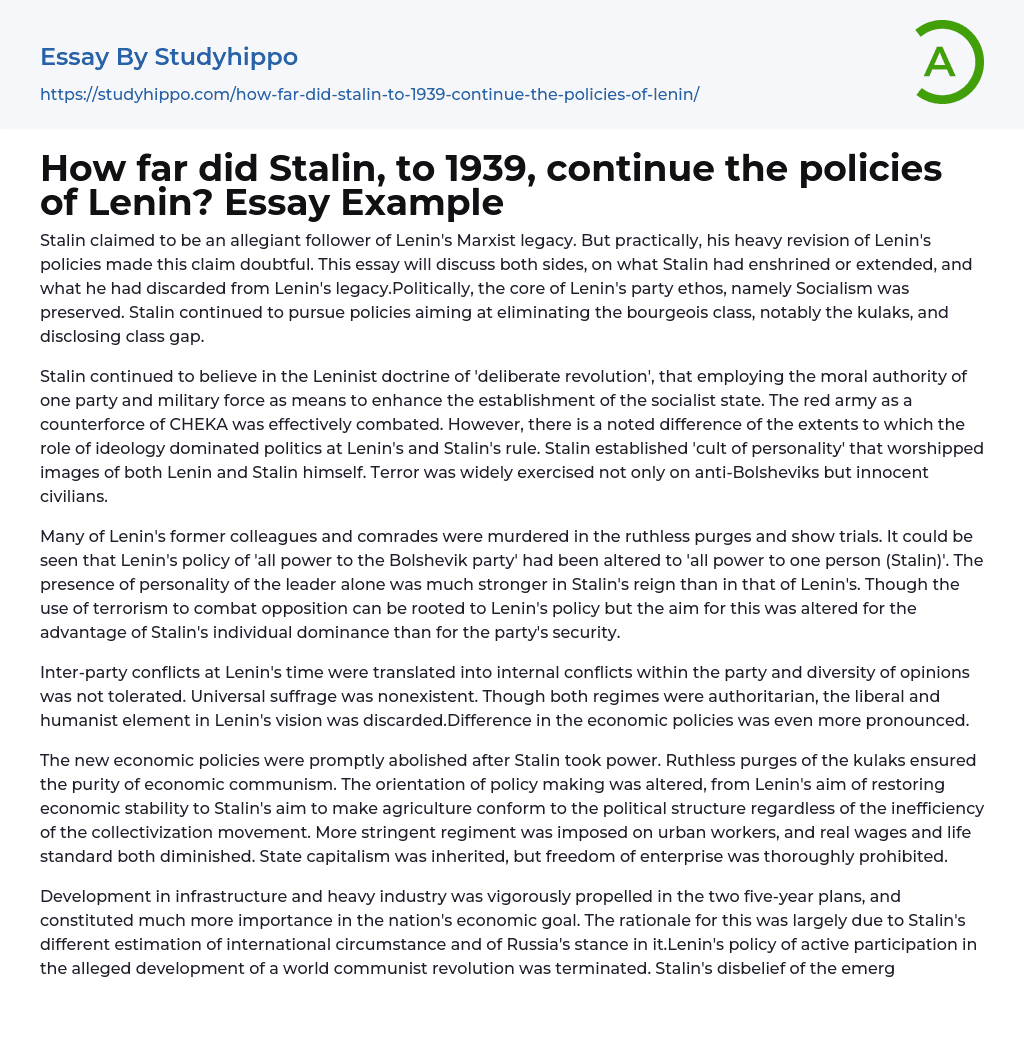

How far did Stalin, to 1939, continue the policies of Lenin? Essay Example
Stalin claimed to be an allegiant follower of Lenin's Marxist legacy. But practically, his heavy revision of Lenin's policies made this claim doubtful. This essay will discuss both sides, on what Stalin had enshrined or extended, and what he had discarded from Lenin's legacy.Politically, the core of Lenin's party ethos, namely Socialism was preserved. Stalin continued to pursue policies aiming at eliminating the bourgeois class, notably the kulaks, and disclosing class gap.
Stalin continued to believe in the Leninist doctrine of 'deliberate revolution', that employing the moral authority of one party and military force as means to enhance the establishment of the socialist state. The red army as a counterforce of CHEKA was effectively combated. However, there is a noted difference of the extents to which the role of ideology dominated politics at Lenin's and Stalin
...'s rule. Stalin established 'cult of personality' that worshipped images of both Lenin and Stalin himself. Terror was widely exercised not only on anti-Bolsheviks but innocent civilians.
Many of Lenin's former colleagues and comrades were murdered in the ruthless purges and show trials. It could be seen that Lenin's policy of 'all power to the Bolshevik party' had been altered to 'all power to one person (Stalin)'. The presence of personality of the leader alone was much stronger in Stalin's reign than in that of Lenin's. Though the use of terrorism to combat opposition can be rooted to Lenin's policy but the aim for this was altered for the advantage of Stalin's individual dominance than for the party's security.
Inter-party conflicts at Lenin's time were translated into internal conflicts within the party and diversity of opinions was not tolerated. Universal
suffrage was nonexistent. Though both regimes were authoritarian, the liberal and humanist element in Lenin's vision was discarded.Difference in the economic policies was even more pronounced.
The new economic policies were promptly abolished after Stalin took power. Ruthless purges of the kulaks ensured the purity of economic communism. The orientation of policy making was altered, from Lenin's aim of restoring economic stability to Stalin's aim to make agriculture conform to the political structure regardless of the inefficiency of the collectivization movement. More stringent regiment was imposed on urban workers, and real wages and life standard both diminished. State capitalism was inherited, but freedom of enterprise was thoroughly prohibited.
Development in infrastructure and heavy industry was vigorously propelled in the two five-year plans, and constituted much more importance in the nation's economic goal. The rationale for this was largely due to Stalin's different estimation of international circumstance and of Russia's stance in it.Lenin's policy of active participation in the alleged development of a world communist revolution was terminated. Stalin's disbelief of the emergence of similar political climate outside Russia significantly changed Russia's foreign policy toward Europe, especially towards Germany. Stalin saw the huge human cost in the ruthless scheme of industrialization as an answer to the threat that Nazi and Fascist aggression had posed. Having discarded Lenin's ideal of 'universal Socialism', Stalin looked forward to 'Socialism in one country'.
This changed the aim of his foreign policies to securing the preservation of Socialist achievement in Russia, by assuming peace with European powers to 1939. He achieved this through The Treaty of Rapallo in 1922 and joining the League of Nations in 1935. It could be seen
that, the alliances Stalin made with Europe was more of a defensive nature than a, as Lenin and Trotsky had in mind, collaborative one. This skepticism, which was proved to be correct, went beyond Lenin's scope.Stalin's proclamation as the heir of Lenin was no more than propaganda used to legitimize his position at the beginning of his reign. In fact, Stalin's policies were all made from a realpolitician's perspective that was completely contrary to Lenin's.
He employed Socialist ideology as an instrument to implement his unchallengeable rule instead of an ideal to strive for. The na�vet� and incompleteness of Lenin's theory also left room for his revision and rewriting of history. Stalin continued only the part of Lenin's policies that were not incompatible with his own ambition, and only highlighted this point to offer a justification for his own policies. His allegiance lied ultimately to himself.
Stalin was not, at any point, a true successor of Lenin.
- Business Law essays
- Contract essays
- Consumer Protection essays
- Property essays
- Ownership essays
- Agreement essays
- Common Law essays
- Contract Law essays
- Justice essays
- Security essays
- Tort Law essays
- United States Constitution essays
- Crime essays
- Lawsuit essays
- Treaty essays
- Family Law essays
- Marijuana Legalization essays
- Constitution essays
- War on Drugs essays
- Court essays
- Jury essays
- Police essays
- Protection essays
- Community Policing essays
- Criminal Law essays
- Judge essays
- Lawyer essays
- Employment Law essays
- Copyright Infringement essays
- Injustice essays
- Intellectual Property essays
- Breach Of Contract essays
- Jurisprudence essays
- Social Injustice essays
- Juvenile Justice essays
- Internet Privacy essays
- Cyber Security essays
- Bill Of Rights essays
- Civil Liberties essays
- First Amendment To The United States Constitution essays
- Fourth Amendment To The United States Constitution essays
- Second amendment essays
- Animal Cruelty essays
- Law Enforcement essays
- Juvenile Justice System essays
- Surveillance essays
- Forensic Science essays
- Crime Prevention essays
- Criminal Justice essays
- Criminology essays



